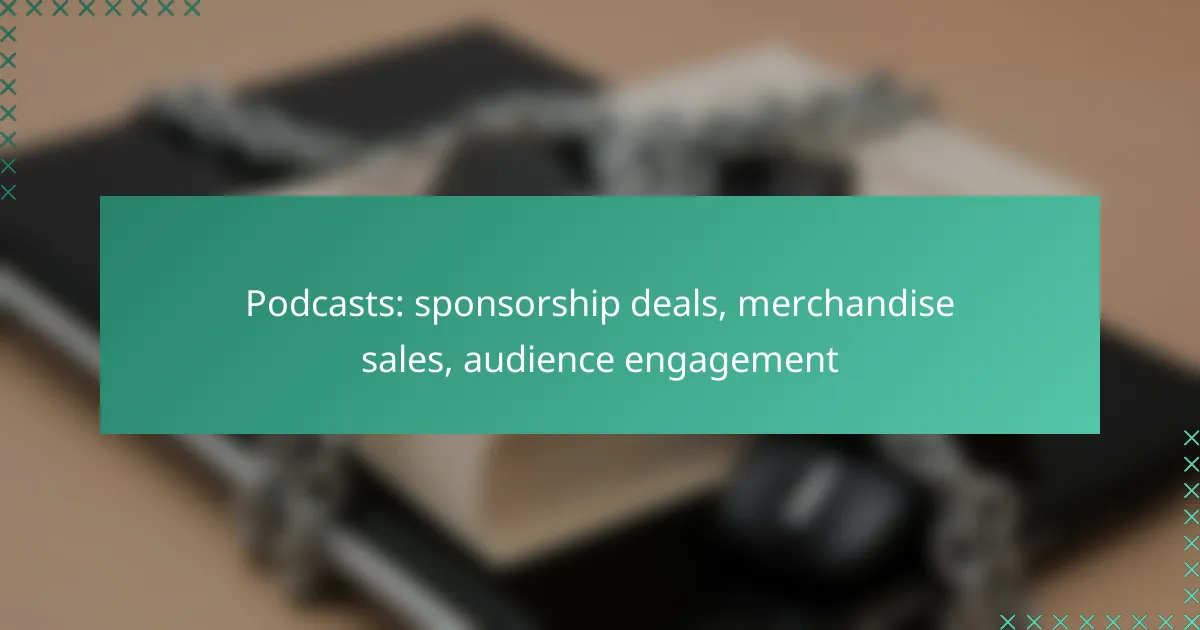Podcasts have become a lucrative platform for monetization through sponsorship deals, allowing creators to promote products while generating revenue. Additionally, effective merchandise sales and audience engagement strategies can further enhance listener loyalty and create immersive experiences. By building a strong brand identity and fostering community interaction, podcasters can tap into multiple revenue streams and deepen connections with their audience.
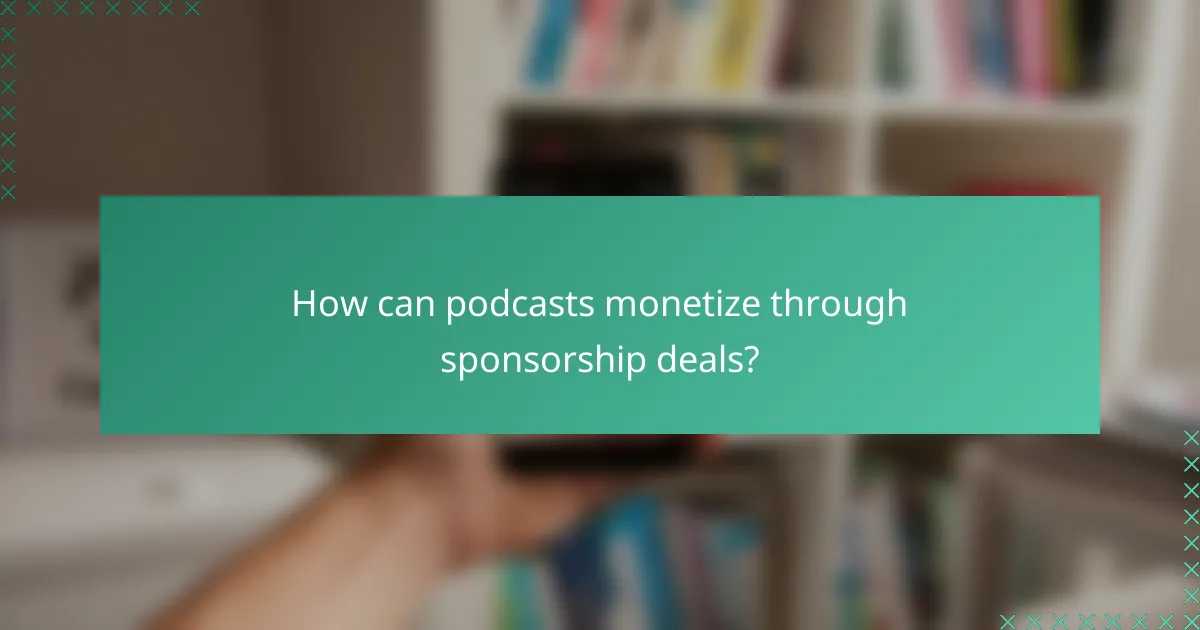
How can podcasts monetize through sponsorship deals?
Podcasts can monetize through various sponsorship deals that allow them to generate revenue while promoting products or services. These deals typically involve direct agreements with brands, ad placements, or collaborative marketing efforts that engage the podcast’s audience.
Direct sponsorship agreements
Direct sponsorship agreements involve a podcast partnering with a brand for a set period, where the brand pays a fee to be featured prominently in episodes. This can include mentions, interviews, or dedicated segments. Podcasters should negotiate terms that reflect their audience size and engagement levels.
For example, a podcast with a dedicated listener base might charge anywhere from a few hundred to several thousand dollars per episode, depending on its reach and niche.
Dynamic ad insertion
Dynamic ad insertion allows podcasts to insert ads into episodes at the time of playback, rather than during recording. This method enables podcasters to update ads regularly, ensuring they remain relevant and timely. It can maximize revenue by targeting specific demographics based on listener data.
Podcasters should consider platforms that offer dynamic ad services, as they can help manage the logistics and provide analytics on ad performance.
Affiliate marketing partnerships
Affiliate marketing partnerships allow podcasters to earn commissions by promoting products or services through unique referral links. When listeners make purchases using these links, the podcaster receives a percentage of the sale. This model can be particularly effective for niche podcasts that cater to specific interests.
To succeed, podcasters should choose affiliate products that align with their content and audience preferences, enhancing authenticity and listener trust.
Brand collaborations
Brand collaborations involve joint marketing efforts between a podcast and a brand, often resulting in co-branded content or events. These partnerships can enhance visibility for both parties and create unique experiences for listeners. Collaborations can include giveaways, live events, or special episodes featuring brand representatives.
Podcasters should seek brands that resonate with their audience to ensure that collaborations feel organic and beneficial for listeners.
Sponsored content segments
Sponsored content segments are specific parts of a podcast episode dedicated to discussing a sponsor’s product or service. This format allows for deeper storytelling and engagement, as hosts can share personal experiences or insights related to the sponsor. It’s crucial that these segments are clearly labeled as sponsored to maintain transparency with the audience.
Podcasters should balance sponsored content with regular programming to avoid alienating listeners, ensuring that the promotional material is relevant and adds value to the episode.
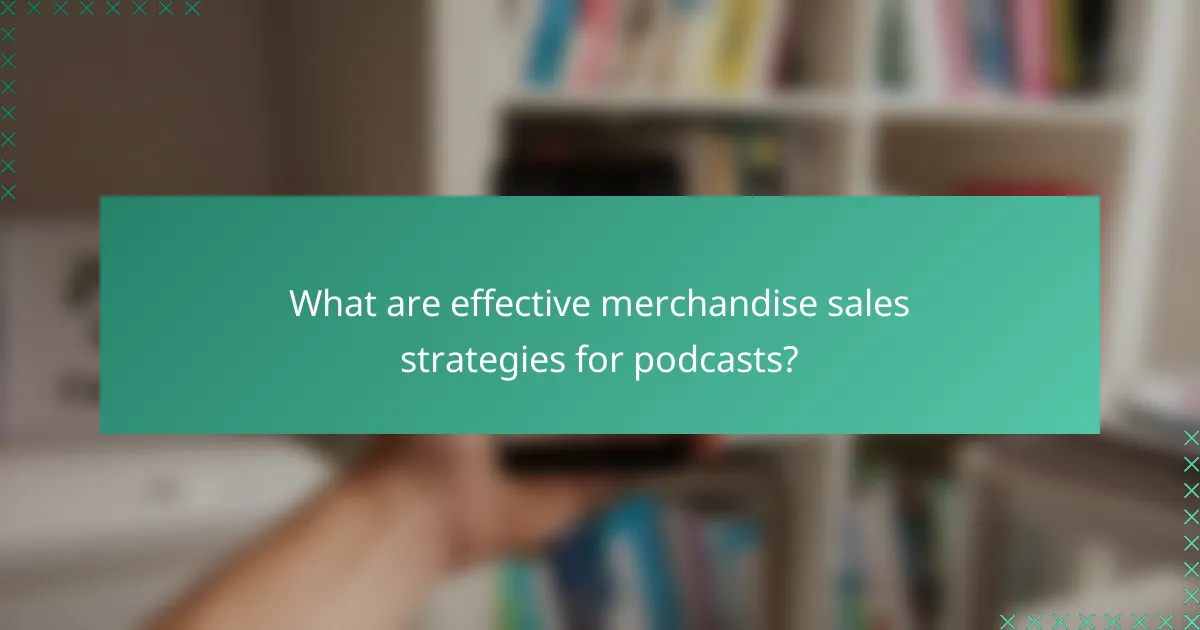
What are effective merchandise sales strategies for podcasts?
Effective merchandise sales strategies for podcasts involve creating a strong brand identity, leveraging e-commerce platforms, and engaging with fans through exclusive offerings. These strategies can enhance listener loyalty and generate additional revenue streams.
Branded merchandise development
Branded merchandise development is crucial for establishing a podcast’s identity. Consider creating items that resonate with your audience, such as apparel, mugs, or stickers featuring your podcast’s logo or catchphrases. Ensure that the quality of the merchandise reflects your brand’s values to foster trust and encourage purchases.
Engage your audience in the design process by soliciting feedback or running polls on social media. This not only creates a sense of ownership but also increases the likelihood of sales as fans feel personally connected to the products.
Utilizing e-commerce platforms
Utilizing e-commerce platforms simplifies the process of selling merchandise. Popular options like Shopify, Etsy, or WooCommerce allow podcasters to set up online stores quickly. These platforms provide user-friendly interfaces and integrated payment solutions, making it easy for fans to purchase items.
Consider the fees associated with each platform, as they can vary significantly. Choose one that aligns with your budget and offers the features you need, such as inventory management or analytics to track sales performance.
Limited edition products
Limited edition products create urgency and exclusivity, which can drive sales. Consider offering seasonal items or special collaborations with artists or other podcasters. This strategy not only boosts merchandise sales but also enhances your podcast’s visibility.
Promote these limited offerings through your podcast episodes and social media channels. Highlight the scarcity to encourage fans to act quickly, ensuring they don’t miss out on unique items.
Fan engagement through merchandise
Fan engagement through merchandise can strengthen community ties. Host giveaways or contests where fans can win branded items, fostering excitement and interaction. This approach not only promotes merchandise but also enhances listener loyalty.
Encourage fans to share photos of themselves with your merchandise on social media, creating a sense of community and providing organic promotion for your brand. Consider featuring these fan photos on your podcast or website to further engage your audience.
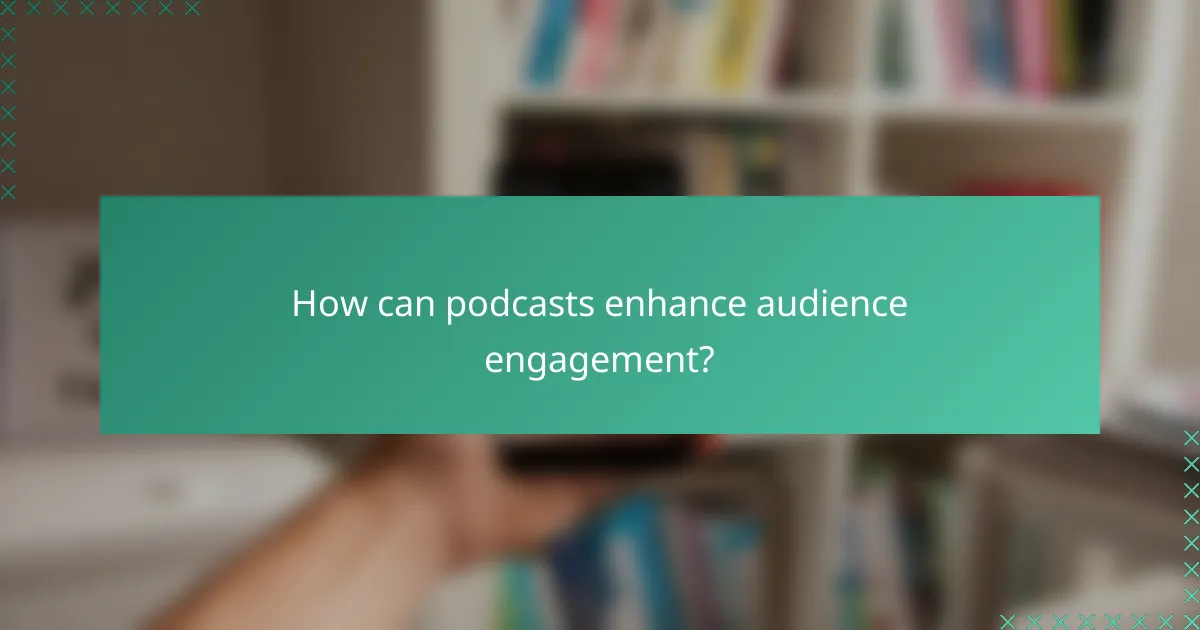
How can podcasts enhance audience engagement?
Podcasts can significantly enhance audience engagement by fostering a sense of community and interaction among listeners. By incorporating various strategies, podcasters can create a more immersive experience that encourages listener participation and loyalty.
Interactive listener feedback
Encouraging interactive listener feedback is essential for building a strong connection with your audience. This can be achieved through surveys, polls, or Q&A sessions where listeners can share their thoughts and opinions. Utilizing platforms like social media or dedicated podcast apps can streamline this process, allowing for real-time engagement.
Consider implementing regular feedback loops, such as asking for listener questions or topic suggestions. This not only makes the audience feel valued but also helps tailor content to their interests, increasing overall satisfaction.
Live events and meetups
Hosting live events and meetups can greatly enhance audience engagement by providing a personal touch. These gatherings allow listeners to connect with hosts and each other, fostering a community atmosphere. Events can range from casual meet-and-greets to more structured live recordings of the podcast.
When planning these events, consider local venues that can accommodate your audience size and budget. Offering exclusive merchandise or experiences at these events can further incentivize attendance and deepen listener loyalty.
Social media integration
Integrating social media into your podcast strategy is crucial for enhancing audience engagement. Platforms like Instagram, Twitter, and Facebook can be used to share episode highlights, behind-the-scenes content, and engage in conversations with listeners. This not only keeps your audience informed but also encourages them to participate in discussions.
Utilize hashtags related to your podcast to create a sense of community online. Regularly engaging with your audience through comments and direct messages can also strengthen relationships and encourage listener loyalty.
Exclusive content offerings
Offering exclusive content can significantly boost audience engagement by providing listeners with additional value. This can include bonus episodes, early access to new content, or special interviews that are only available to subscribers or members. Such offerings create a sense of exclusivity and reward loyal listeners.
Consider using platforms like Patreon or subscription services to manage these exclusive offerings. Clearly communicate the benefits of subscribing, and ensure that the exclusive content is genuinely valuable to your audience to encourage sign-ups and retention.

What criteria should be considered for selecting podcast sponsorships?
Selecting podcast sponsorships requires careful consideration of several key criteria to ensure alignment with your audience and brand values. Focus on audience alignment, brand reputation, and potential return on investment (ROI) to make informed decisions that benefit both the podcast and the sponsor.
Audience alignment with brand
Audience alignment is crucial when selecting sponsors for your podcast. The sponsor’s target demographic should closely match your listeners to maximize engagement and effectiveness. For example, if your podcast focuses on fitness, partnering with a health supplement brand would likely resonate well with your audience.
Consider conducting surveys or analyzing listener data to understand demographics, interests, and purchasing behaviors. This information will help you identify brands that appeal to your audience, ensuring a more authentic partnership.
Brand reputation and values
Evaluating a sponsor’s reputation and values is essential to maintain your podcast’s integrity. Research the brand’s history, customer reviews, and social media presence to gauge public perception. A well-respected brand can enhance your podcast’s credibility, while a controversial sponsor may alienate your audience.
Ensure that the sponsor’s values align with your podcast’s mission and content. For instance, if your podcast promotes sustainability, partnering with an eco-friendly brand will strengthen your message and resonate with your listeners.
Potential ROI analysis
Analyzing potential ROI is vital for determining the financial viability of a sponsorship deal. Consider factors such as the sponsor’s budget, expected reach, and the commission structure. A common approach is to estimate the number of conversions or sales generated from your audience and compare that to the sponsorship fee.
Use metrics like listener engagement rates and previous sponsorship performance to project potential returns. Aim for partnerships that offer a favorable cost-per-acquisition (CPA) ratio, ideally in the low tens of dollars, to ensure a profitable collaboration.
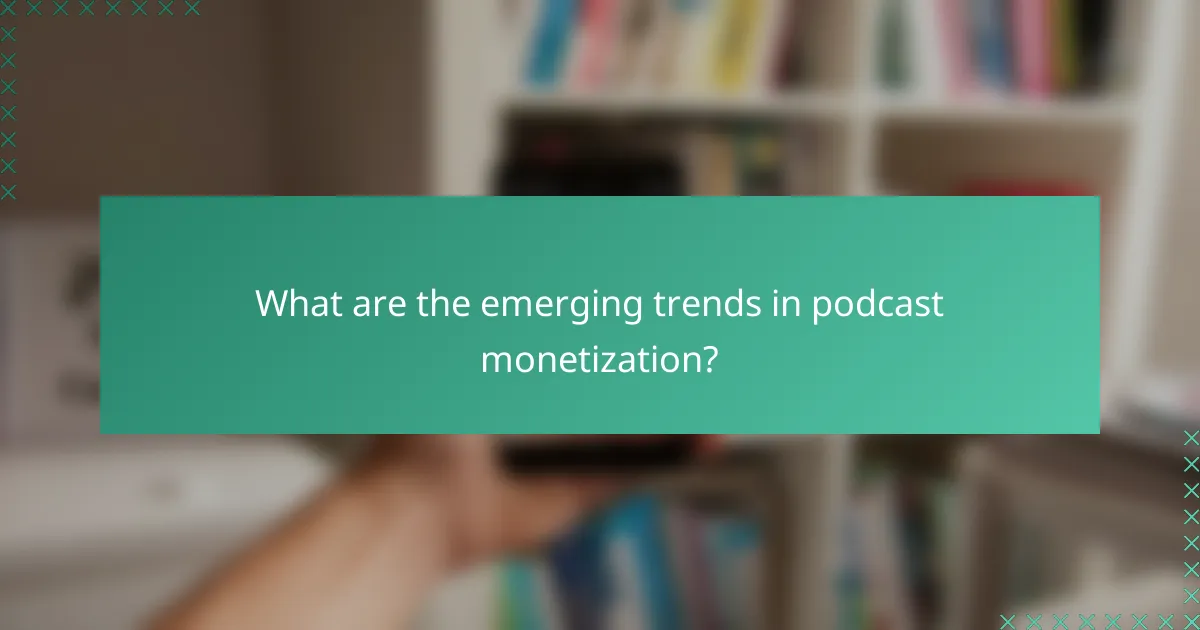
What are the emerging trends in podcast monetization?
Emerging trends in podcast monetization include innovative strategies that enhance revenue streams for creators. These trends focus on subscription models, blockchain technology, and catering to niche audiences, allowing podcasters to diversify income and engage listeners more effectively.
Subscription-based models
Subscription-based models allow listeners to pay a recurring fee for exclusive content, ad-free experiences, or early access to episodes. Platforms like Patreon and Apple Podcasts Subscriptions have popularized this approach, enabling creators to build a loyal subscriber base.
Podcasters should consider offering tiered subscription levels, providing different benefits at various price points. This strategy can attract a wider audience while maximizing revenue potential. Common pitfalls include overpromising content and underdelivering, which can lead to subscriber churn.
Blockchain and NFT integrations
Blockchain technology and NFTs (non-fungible tokens) are gaining traction in podcast monetization by providing unique ownership and access to content. Creators can sell NFTs that grant listeners special privileges, such as exclusive episodes or merchandise discounts.
While integrating blockchain can enhance transparency and security, podcasters should be aware of the technical complexities and potential regulatory challenges. It’s essential to educate the audience about the value of NFTs and ensure that the offerings resonate with their interests.
Increased focus on niche markets
Focusing on niche markets allows podcasters to target specific audiences with tailored content, leading to higher engagement and loyalty. This trend is particularly effective as listeners seek out shows that resonate with their unique interests and experiences.
Podcasters should conduct thorough market research to identify underserved niches and create content that addresses those needs. Collaborating with influencers or experts within the niche can also enhance credibility and attract a dedicated listener base. However, creators must balance niche focus with growth potential to avoid limiting their audience size.
